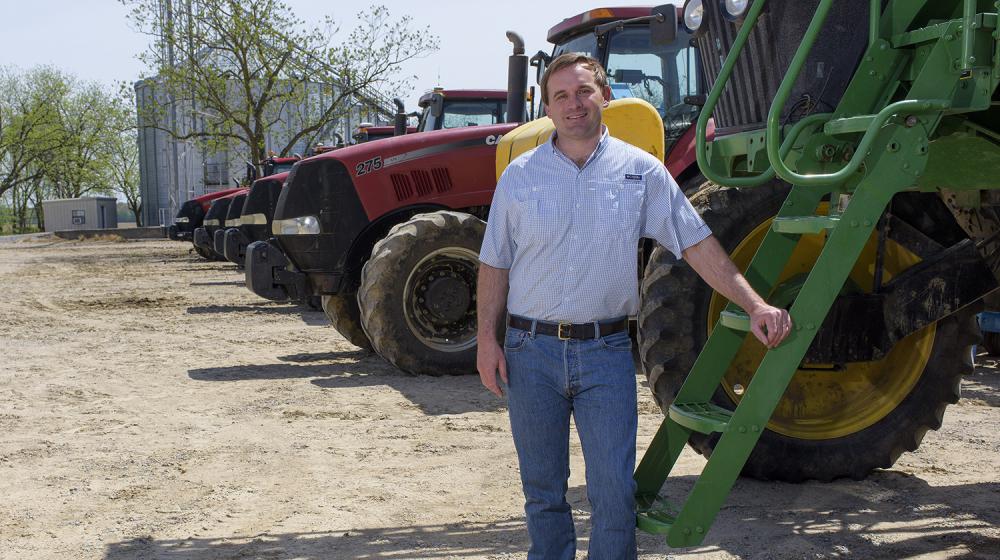Bridging the Gap

Farming has been a part of Will Smythe's life for as long as he can remember.
Producer grows leadership skills in Extension program
Story by Leah Barbour • Photos by Kevin Hudson
Farming is all Will Smythe has ever known. The Washington County producer, whose acres of corn and soybeans grow in Tribbett, supports his family’s farm operation beside his father and brother, his wife and children, every day. Smythe is quick to see, however, that success in agriculture is defined by much more than his year-to-year profitability.
“We’re right next to the Research and Extension Center in Stoneville, and we have a research plot beside our farm in Tribbett,” Smythe explains. “We work a lot with the people doing research at Mississippi State, and Extension is giving us the information we need to improve farming practices.
“I continue to be involved in Delta Council, and, in 2017, my corporate sponsor, Southern Ag Credit, asked if I’d be interested in participating in Extension’s Thad Cochran Agricultural Leadership Program,” he continues. “I said yes without thinking too much about it.”
Will Smythe explains why he participates in the Thad Cochran Agricultural Leadership Program (TCALP), Mississippi's premier agricultural leadership and policy program delivered by the Mississippi State University Extension Service.
As vice chair of Delta Council’s Soil and Water Resources Committee, Smythe works to preserve and enhance natural resources and conservation initiatives by sharing input from local producers with local, state, and national policymakers. In
Extension’s leadership program, TCALP for short, Smythe has had the chance to learn more about the wide range of agricultural pursuits in Mississippi, the U.S., and the world.
During nine seminars, including six in Mississippi, one in Washington, DC, one out-of-state, and one international trip, over 22 months, TCALP has been a significant—and valuable—investment for Smythe, he says.
Smythe says his eight fellow participants offer a variety of viewpoints about agricultural interests and industry. The diverse opinions presented suggest new insights about the best ways to maintain and grow Mississippi’s agricultural industry, he affirms.
“We’ve all got to be advocates for agriculture, and we have to stick together. This course has taught me the importance of knowledge and networking, and leadership has a lot to do with the relationships you develop.”
TCALP participants discover how best to act as leaders in the agricultural industry. Seminars in the program cover a range of agricultural interests, including poultry production, timber and forestry, cattle and dairy production, and row-crop operations, among others.
“The program covers every sector, from farm policy at the state level to the national level, and we’ve been exposed to different leaders with different challenges,” Smythe says. “They explain how they better their community and farm situations, and it shows us how to add value to ourselves, our farm operations, and our communities.”
As TCALP organizers, including program director Dr. Michael Newman, prepare for the first group to complete its studies in August, they are also preparing for the second leadership class, to begin in November. Newman recommends producers who are strong advocates for agriculture and interested in TCALP visit http://extension.msstate.edu/tcalp to learn more.
“We are actively recruiting this summer, and we are looking for emerging agricultural leaders who want to serve the industry in advanced leadership roles,” Newman explains. “TCALP offers intentional and purposeful opportunities to develop leadership skills and gain knowledge about public policy.”
Smythe says he would encourage anyone with a love of agriculture to consider developing his or her leadership skills through TCALP.
“For me, the class has met my expectations: it’s all I thought it would be,” Smythe emphasizes. “It’s done a great job of exposing us to real agricultural leadership and farm leadership. Being from the Delta, I didn’t know a lot about the other agricultural sectors, but I’m learning.
“I’ve always wanted to be a bridge between the next generation of leaders and the current generation,” he reveals. “We’re going to solve problems together, and the stronger that this agricultural leadership program can be, the more people will get out of it, from Mississippi to the entire globe.”


